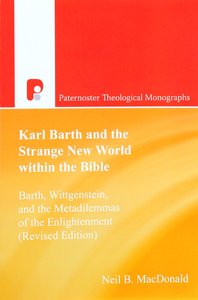
This is a new, major study of the twentieth-century theologian Karl Barth. Its chief strength is that it demonstrates the genuine intellectual force behind Barth?'s approach to the Bible. Drawing on the history of biblical, theological and philosophical criticism originating in the Enlightenment - and most notably on the arguments of the Austrian philosopher, Ludwig Wittgenstein - it dares the thought that, if Barth is right, the Bible understood the Enlightenment better than it understood the Bible, and, indeed, better than the Enlightenment understood itself: according to its own canons of inquiry it ought not to have lost faith with the Bible in the way that it did.



